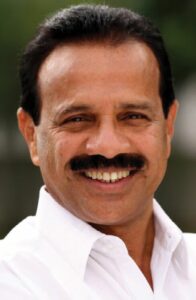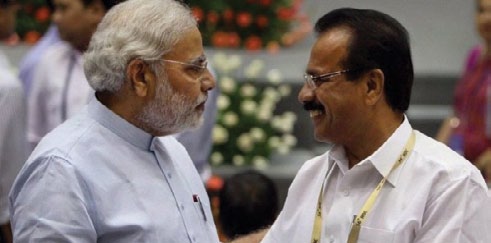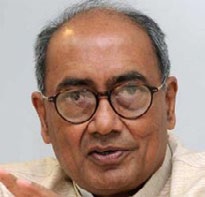
Shri. D V Sadananda Gowda
Minister for Law & Justice, Govt. of India
As Chief Minister, D V Sadananda Gowda, currently
Union Law Minister, is credited with introduction
of Sakala- a scheme to provide for guarantee of services citizens in
the state of Karnataka within the stipulated time limit, which aims at
minimising corruption. This scheme was appreciated at the national level
also. During his period, CCTV was installed
in CM’s Office which was linked to You Tube to facilitate direct relay of
CM’s Office, while his government successfully hosted second Golbal
Investors Meet and Global Agricultural, Commerce and Food processing meet.
Agreements were signed for potential investment of Rs.7.60 lakh crores.
For him, development was the key issue – several measures were initiated
to minimise corruption , eg: issue of permission to industries within 24
hours of the High Power Committee meeting, which is appreciated by all
industrialists as a very innovative step. During his tenure, for the first time
the state budget above one lakh crores i.e. Rs.1.13 lakh crores was presented.
His government also took a decision to implement Yettinahole Yojane, a
scheme to provide drinking water to six districts and allotted Rs.1000 crores
in the budget. Following are excerpts from an exclusive interview with DVS.
Thoughts on Karnataka and the things to be done to take a state into
greater heights The present Central government
basically emphasises on the cooperative
federalism. The relationship
of the state and centre should be given
priority. For that purpose only NITI
Ayog has been formed in the place of
the planning commission.
Chief Ministers are made members
of NITI Ayog. Earlier in Planning
Commission Chief Ministers were
not members.

Union Law Minister Shri. D V Sadananda Gowda with Prime Minister
Shri Narendra Modi
Since Chief Ministers are members of the new system, they can redress their issues before NITI Ayog. This time, in the 14th finance commission 42% of the devolution of
funds goes to the States. In the 13th finance commission it was only 32%.
The central government is planning to have smart cities all over the
country and Karnataka is going to get nearly six such smart. One lakh
crore rupees is allotted for this project. And we are getting one
IIT. The place is yet to be decided. Already Food Parks have come.
Tumkur and Mysore are given priority. These are a few in the first
year, and it will continue in the next four years so that we will see that
all areas where Karnataka needs assistance, it will get from the centre.
The areas where the state government has to concentrate on
Under the Constitution certain things need to be done by the
state only. State subjects are there, concurrent list, certain subjects are
there and there are certain subjects exclusively in the domain of the
central government. So whenever the Chief Minister
comes up with a proposal, for any of the assistance from the centre, we
are here to support the cause of the
state.
Highlights of his tenure as Chief
Minister
During my period, I brought right
to services act wherein within the
stipulated period, the government
services should be provided to the
citizen. Otherwise the defaulting
officer will be penalised. Now in
Karnataka nearly 685 services are
included. This time ‘Sakala’ got the
first prize from the Prime Minister
as far as government services are
concerned.
I’ve written to Hon’ble Prime
Minister that right to services act
called Sakala in Karnataka should be
implemented at the centre also.
Regrets, if any
The mandate was given to BJP
and it is a continuous government,
whatever my predecessor started
has to be continued and whatever
promises made by my party during
elections that has been taken care of.
During my period, the budget size
went beyond Rs one lakh crore. Zero
per cent interest, that is interest free
loans to the farmers was given in my
regime.
Steps needed for speedy
disposal of lots of cases in courts
For speedy disposal of the cases,
one: the judiciary is independent and
they have to take care of the things.
Second thing is that the government
gives all sorts of support to the
judiciary for the speedy disposal of
cases.
For example, Lokadalat plus the
computerisation of courts and
providing infrastructure to the
judiciary. These are the areas the
government is focusing on . In the last
Lokadalat on 6th December 2014,
44 lakh pending cases in the courts
have been disposed off. 14,249
courts have been computerised.
Now phase 1 of the computerisation
is over and now we are going for
phase 2 , so that right from the
filing of the cases till the recording
of the evidence , everything will take
a new shape. We are planning to
record the evidence of the accused
who are under judicial custody
from the jail itself. We are bringing
a national Litigation policy. The
draft is ready, so that unnecessary
government litigation should not
be there, so we want to put an end
to this. We are removing redundant
and obsolete laws from the statute
book. So far already 1741 such laws
are identified and already four bills
are moved and nearly 1050 laws are
removed from the statute book .
Major reforms being planned
and proposed in the judiciary
So you have already seen the
National Judicial Appointments
Committee will be brought in
the place of Collegium ,thereby a
transparency in appointment of
judges will be brought.
We are bringing amendments to
the Arbitration Act and already for
the speedy disposal of commercial
cases, we have already moved a bill
for establishment of commercial
courts exclusively to deal with
commercial matters.
Strategy to deal with shortage of
judges
Practically it is the judiciary and
they have to appoint the judges. It
is true that in the High Courts there
are nearly 350 vacancies and in
subordinate courts about 30-35%
vacancies. That has to be filled at the
earliest. In the phase 2 modernisation
in all subordinate courts and the High
Courts, all documents of the courts
right from judgement, pleadings,
everything you will get it online.
A person can know the status of
his case in the Delhi court from
Thiruvananthapuram.
On BBMP trifurcation
BBMP trifurcation is not necessary.
One system is already established
and Bangalore is an IT city and IT
hub. So for administrative purpose
they should use more and more
IT initiatives. The Bangalore
Mahanagara Palike can work
effectively under the present system.
In Delhi there are three
Metropolitan corporations and they
want to merge now. Earlier there
was no computer, IT facility. Now
everything is there.
Instead of trifurcating BBMP,
they can appoint two or three
Commissioners and give charge
for specific areas to make
administration more efficient.
If you trifurcate BBMP, whole
Bangalore will lose its image.







